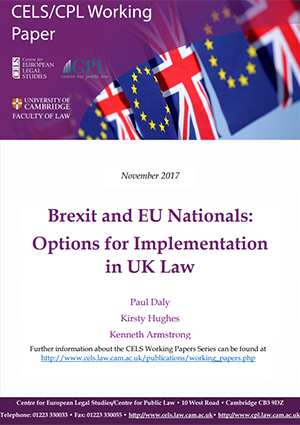 The Faculty of Law's Centre for European Legal Studies and Centre for Public Law have published a second Brexit briefing paper on 'Brexit and EU Nationals: Options for Implementation in UK Law'. The first paper in the series - 'Implementing Transition – How Would it Work' - has been downloaded more than 600 times since it was released in October.
The Faculty of Law's Centre for European Legal Studies and Centre for Public Law have published a second Brexit briefing paper on 'Brexit and EU Nationals: Options for Implementation in UK Law'. The first paper in the series - 'Implementing Transition – How Would it Work' - has been downloaded more than 600 times since it was released in October.
Although both the European Union and the United Kingdom seem now to agree that the Withdrawal Agreement to be negotiated under Article 50 TEU should have "direct effect" in the UK, there has been little or no discussion of the mechanisms available to make the rights enshrined in the Withdrawal Agreement effective in UK courts in the post-Brexit legal order.
With a view to informing public debate on this important issue, the Faculty's Paul Daly, Kirsty Hughes and Kenneth Armstrong canvass a range of options: an international agreement; an ordinary domestic statute; a domestic statute that replicates important enforcement mechanisms contained in the Human Rights Act 1998; and the continuation, for limited purposes, of the European Communities Act 1972. The authors also briefly consider the implications for the rights of EU nationals of a 'No Deal' scenario.
The focus in this paper is on the rights of EU nationals, but the models analysed could be adapted and adopted to give domestic legislative force to the whole of the Withdrawal Agreement. The analysis in this briefing paper thus provide a useful framework for future discussion about the means by which obligations negotiated under Article 50 could be given legal effect in the UK after it has left the EU.
You can download 'Brexit and EU Nationals: Options for Implementation in UK Law' from SSRN.

